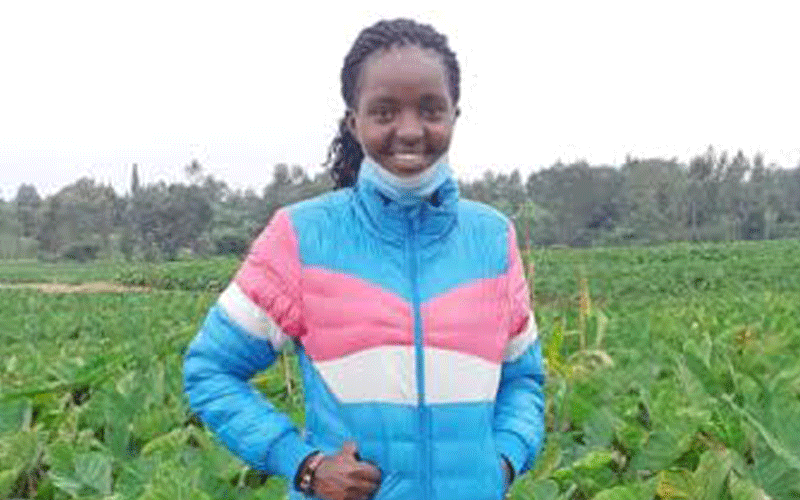Student finds niche in arrowroot farming to beat Covid boredom

Since coronavirus pandemic broke out in the country in March, Wanjiku Njeru, 24, a fourth year education student at Chuka University took to growing the tuber, earning her a fortune.
Every day when the sun rises and the skies open up in Njukiini in Kirinyaga county, Hellen Wanjiku Njeru, fondly referred to as Wanduma prepares herself for another day of hustle.
And once she picks up her farming tools, she sets off for the farm, hoping that the day will be productive.
Since breaking out of coronavirus pandemic seven months ago, this has been the daily routine for Njeru, a fourth year Bachelor of Education student at Chuka University.
She is so passionate about arrowroots such that she has earned the title Wanduma (arrowroot farmer) from the locals.
“I started small scale arrowroot farming two years ago though my mother has been doing it in large scale.
I can say that I learned the ropes of the trade from her and she has been my biggest inspiration and supporter,” says Njeru.
“So when Covid-19 struck and we were forced to go back home, I thought of starting to grow and sell the crop by myself, and since April, I have been into it.
Arrowroots are well paying and my mother has been educating us with the proceeds got from selling them.
With time, I wished to join her and I was lucky enough that she lend me a portion of her farm to cultivate the crop two years ago,” she narrates.
The 24-year-old says life while growing up in the village wasn’t easy as one had to start working in the farm as early as they enrolled in school.
“I am happy and grateful because the early exposure to farm life got me acquainted with best farming practices, most of which I now utilise in farming,” she explains.
Hands on
Njeru says that starting off was easy for her since everything was provided freely, including the land, suckers, manure and labour since her other managed the farm for her while she was in school.
“I started selling my produce coincidentally when President Uhuru Kenyatta put in place the 7pm curfew as one of the measures to contain the pandemic.
I was to harvest the crop the next day, but the buyer cancelled the deal due to the curfew. I got really worried as the arrowroots had matured and couldn’t hold any longer under the ground,” she recounts.
“I went on to take and post pictures of the arrowroots on several WhatsApp groups and requested people to make orders. Fortunately, I was able to get orders totalling 150 kilogrammes.
I then went on and harvested the crop the next day and dispatched them to our various clients in Nairobi, Thika and other places through a local transport company, Neno Sacco.
Since then, I have made it a weekly routine to send orders made by friends and clients who I find online.
Social media groups have been particularly supportive. She markets the tubers through her Facebook page Ciku Njeru Wanduma.
“Currently, the price of a kilogramme of arrowroots stands at Sh85, which she says isn’t constant and varies depending on demand.
With the proceeds she makes from the sale of arrowroots, Njeru says she saves some of the money while the rest goes into sustaining her chicken and vegetable farm projects. Arrowroots take between six and seven months to mature.
Ups and downs
“I find arrowroot farming the best and easiest to do as it does not require much effort.
For example, they don’t require spraying every now and then. They are also hardly invaded by pests.
I have not seen any, unless a few locusts, which do not do any damage to the crop,” she says.
However, when it comes to farming arrowroots, it’s a little challenging, especially with water.
“Too much of it spoils the crop while too little hinders proper growth. Arrowroots grow well on a wetland with clay soil, but with a well-controlled water flow, and not in a water logged area.
On the bright side, it is also economical to farm arrowroots because you only need manure as the main input, no fertilisers nor pesticides,” she says.
Njeru says the arrowroots can be grinded into flour that can be used to bake or make porridge, roasted, boiled and taken with tea, fried with potatoes to make a Kikuyu meal called gitowero or deep fried and eaten as a snack.
Asked whether she will still be farming once school resumes, Njeru says, she won’t stop.
“I will continue, sales might go down, but that will just be for a little while since I am almost finishing school,” she smiles.
She encourages other youths to take advantage of every opportunity that comes along their way.
“Let us not wait until we acquire employment, whereas we can create jobs wherever we are.
Capital is normally a major discouragement to pursue business ventures, but starting small is better than choosing to remain idle.
Let parents also take up the task of holding their children’s hands and support them as long as it is a positive move. The future is bright. Let’s not limit ourselves,” Njeru says.












